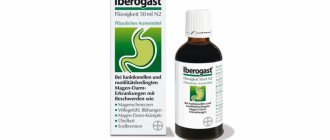Pharmacology
Pharmacological action: anticholinesterase.
Inhibits cholinesterase and blocks the breakdown of acetylcholine, which carries out normal transmission to the central nervous system. Slows down the progression of Alzheimer's disease, reduces the severity of cognitive symptoms (according to the Folstein test), in some cases restores the daily activity of patients and facilitates their care. Corrects behavioral disorders: apathy, hallucinations and mindless repetitive movements.
After oral administration, Cmax in plasma is reached in approximately 3–4 hours; food intake does not affect absorption. T1/2 from plasma is approximately 70 hours. With systematic use in single doses, equilibrium concentration is usually achieved within 2-3 weeks after the start of therapy. The distribution of donepenesil in various tissues of the body has not been sufficiently studied. It is assumed that donepenesil and/or its metabolites can persist in the body for more than 10 days.
Dopenesil is metabolized in the liver. The main products of metabolism are compounds M1 and M2 (products of O-dealkylation and hydroxylation), M11 and M12 (products of glucuronidation of M1 and M2, respectively), M4 (hydrolysis product) and M6 (N-oxidation product). There is no information about the enterohepatic recirculation of dopenesil and/or its metabolic products. The binding of donepenezil to plasma proteins is 95%. There is no information on the binding of its active metabolite 6-O-desmethyldopenesil to plasma proteins. Dopenesil is excreted, as well as its metabolites, mainly in the urine: 79% of the dose is found in urine and 21% in feces. Dopenesil is predominantly found in urine.
Pharmacokinetics in special clinical situations
Gender, race and smoking do not have a significant effect on plasma dopenesil concentrations. The average levels of dopenesil in the plasma of patients correspond to those in healthy young volunteers. Mild to moderate liver dysfunction and renal dysfunction do not have a significant effect on the clearance of dopenesil.
Alzepil, 28 pcs., 5 mg, film-coated tablets
The effectiveness of donepezil has not been established in patients with severe Alzheimer's dementia, other types of dementia, or memory impairment (eg, age-related cognitive decline).
Alzepil® is a cholinesterase inhibitor, and therefore it can enhance succinylcholine muscle relaxation during anesthesia.
Cardiovascular disorders.
Cholinesterase inhibitors, due to their pharmacological action, may have vagotonic effects on heart rate (for example, cause bradycardia).
The possibility of such an action should be especially taken into account in case of weakness of the sinus node or other disorders of supraventricular conduction in the heart, for example, with sinoatrial or atrioventricular block.
Fainting and seizures have been reported. When evaluating such patients, the possibility of heart block or long pauses in sinus rhythm should be considered.
Gastrointestinal dysfunction
. Patients at increased risk of developing ulcers, such as those with a history of peptic ulcer disease or those receiving concomitant NSAID treatment, should be monitored for symptoms of ulceration. However, clinical trials of donepezil, compared with placebo, did not show an increase in the incidence of peptic ulcers or gastrointestinal bleeding.
Genitourinary system.
Cholinomimetics may cause bladder outflow obstruction, but such effects were not observed in clinical trials of donepezil.
Neurological conditions.
Cholinomimetics are thought to have some tendency to provoke generalized seizures. However, seizure activity can also be a manifestation of Alzheimer's disease.
Cholinomimetics may increase or cause extrapyramidal symptoms.
Neuroleptic malignant syndrome.
Neuroleptic malignant syndrome is a potentially life-threatening disorder characterized by hyperthermia (fever), muscle rigidity, autonomic nervous system disturbances, altered consciousness, and elevated serum creatinine phosphokinase levels. Additional symptoms may include myoglobinuria (rhabdomyolysis) and acute renal failure.
There are very rare reports of the development of neuroleptic malignant syndrome associated with the use of donepezil, especially in patients also receiving concomitant therapy with antipsychotic drugs.
If the patient develops signs and symptoms of neuroleptic malignant syndrome or has an unexplained high fever without additional clinical manifestations, treatment should be discontinued.
Pulmonary dysfunction.
Cholinesterase inhibitors, due to their pharmacological effects, should be prescribed with caution to patients with a history of asthma or obstructive pulmonary disease. The simultaneous administration of Alzepil® and other acetylcholinesterase inhibitors, as well as agonists or antagonists of the cholinergic system, should be avoided.
Severe liver dysfunction.
There are no data on the use of the drug in patients with severe liver dysfunction.
Mortality in clinical trials of vascular dementia.
Three 6-month clinical trials were conducted in patients meeting the
NINDS-AIREN
for possible or probable vascular dementia (VaD).
The NINDS-AIREN
criteria are designed to identify patients whose dementia may be due to vascular causes only and to exclude patients with Alzheimer's disease.
In the first study, the incidence of death was 2/198 (1%) in the group receiving 5 mg donepezil, 5/206 (2.4%) in the group receiving 10 mg donepezil, and 7/199 (3.5%) in the group receiving 10 mg donepezil. placebo group. In the second study, the incidence of death was 4/208 (1.9%) in the group receiving 5 mg donepezil, 3/215 (1.4%) in the group receiving 10 mg donepezil, and 1/193 (0.5% ) in the placebo group. In the third study, the incidence of death was 11/648 (1.7%) in the donepezil 5 mg group and 0/326 (0%) in the placebo group. The incidence of death in all donepezil groups in the three diabetes trials (1.7%) was numerically higher than in the placebo group (1.1), but this difference was not statistically significant.
The majority of deaths in patients receiving donepezil hydrochloride or placebo were due to various vascular events, which are expected in this population of elderly individuals with underlying vascular disease. Analysis of all serious non-fatal and fatal vascular events did not reveal a difference in the incidence of their occurrence in the groups receiving donepezil and placebo.
In the pooled Alzheimer's disease studies (n = 4,146) and the same Alzheimer's disease studies plus vascular dementia studies (6,888 total patients), mortality rates in the placebo groups were numerically superior to those in the donepezil hydrochloride groups.
Impact on the ability to drive vehicles and operate machinery.
Donepezil has a slight or moderate effect on the ability to drive vehicles and operate machinery. Dementia of the Alzheimer's type may itself be accompanied by impairments in the ability to drive and use technology. The ability of a patient with Alzheimer's type dementia to drive a car or use complex equipment while taking donepezil should be decided by a physician after assessing the patient's individual response to treatment.
Overdose
Symptoms: cholinergic crisis (severe nausea, vomiting, profuse salivation, sweating, bradycardia, decreased blood pressure, respiratory depression, collapse and convulsions).
Treatment: symptomatic therapy. Tertiary anticholinergics can be used as an antidote, in particular atropine at an initial dose of 1–2 mg IV, then the dose is adjusted depending on the effect. It is not known whether dopenesil and/or its metabolites are removed by dialysis (hemodialysis, peritoneal dialysis or hemofiltration).
Precautions for the substance Dopenesil
Treatment is carried out under mandatory medical supervision. One of the conditions for effective therapy is appropriate patient care. During the course you should avoid drinking alcohol.
Maintenance therapy can be continued as long as the therapeutic effect continues. If the drug stops working, it should be discontinued. The effectiveness of dopenesil hydrochloride in patients with severe dementia of the Alzheimer's type, other types of dementia, or other types of memory impairment (eg, age-related cognitive decline) has not been studied. Dopenesil hydrochloride, being a cholinesterase inhibitor, can enhance succinylcholine-type muscle relaxation during anesthesia.
Cholinesterase inhibitors (including dopenesil hydrochloride) can have a vagotonic effect on heart rate (in particular, cause bradycardia). The potential for such an effect may be important in patients with sick sinus syndrome or other supraventricular conduction disorders such as sinoatrial or AV block.
If the risk of developing an ulcer is increased, for example in patients with a history of peptic ulcer disease or patients receiving concomitant NSAID therapy, increased caution should be exercised during treatment, because Cholinomimetics may increase acid secretion in the stomach.
Given the cholinomimetic effect of cholinesterase inhibitors, dopenesil hydrochloride should be administered with caution to patients with a history of asthma or obstructive pulmonary disease.
Instructions for use ALZEPIL®
The effectiveness of donepezil has not been established in patients with severe dementia due to Alzheimer's disease, other types of dementia, or memory impairment (eg, age-related cognitive decline).
Anesthesia
Alzepil® is a cholinesterase inhibitor, and therefore it can enhance succinylcholine-type muscle relaxation during anesthesia.
Cardiovascular disorders
Cholinesterase inhibitors, due to their pharmacological actions, may have vagotonic effects on heart rate (eg, cause bradycardia). The possibility of such an action should be especially taken into account in case of weakness of the sinus node or other disorders of supraventricular conduction in the heart, for example, with sinoatrial or AV block.
Fainting and seizures have been reported. When evaluating such patients, the possibility of heart block or long pauses in sinus rhythm should be considered.
Gastrointestinal dysfunction
Patients at increased risk of developing ulcers, such as those with a history of peptic ulcers or those receiving concomitant NSAID treatment, should be monitored for symptoms of ulceration. However, clinical studies of donepezil compared with placebo did not show an increase in the incidence of peptic ulcers or gastrointestinal bleeding.
Genitourinary system
Cholinesterase inhibitors may cause bladder outflow problems, but such effects were not observed in clinical studies of donepezil.
Neurological conditions
Cholinesterase inhibitors are thought to have some tendency to precipitate generalized seizures. However, seizure activity can also be a manifestation of Alzheimer's disease.
Cholinesterase inhibitors may increase or cause extrapyramidal symptoms.
Pulmonary dysfunction
Cholinesterase inhibitors, due to their pharmacological effects, should be prescribed with caution to patients with a history of bronchial asthma or obstructive pulmonary disease.
The simultaneous administration of Alzepil® and other acetylcholinesterase inhibitors, as well as cholinomimetics and anticholinergic blockers should be avoided.
Severe liver dysfunction
There are no data on the use of the drug in patients with severe liver dysfunction.
Neuroleptic malignant syndrome (NMS)
Neuroleptic malignant syndrome is a potentially life-threatening disorder characterized by hyperthermia (fever), muscle rigidity, autonomic nervous system disorders, altered consciousness, and increased serum CPK activity. Additional symptoms may include myoglobinuria (rhabdomyolysis) and acute renal failure.
There are rare reports of NMS associated with the use of donepezil, especially in patients also receiving concomitant therapy with antipsychotic drugs.
If the patient develops signs and symptoms of NMS or has an unexplained high temperature without additional clinical manifestations, treatment should be discontinued.
Mortality in clinical trials of vascular dementia
Three 6-month clinical trials were conducted in patients meeting the NINDS-AIREN criteria for possible or probable vascular dementia (VaD). The NINDS-AIREN criteria are designed to identify patients whose dementia may be due to vascular causes only and to exclude patients with Alzheimer's disease.
In the first study, the incidence of death was 2/198 (1%) in the donepezil hydrochloride 5 mg group, 5/206 (2.4%) in the donepezil hydrochloride 10 mg group, and 7/199 (3.5%) in the placebo group. . In the second study, the incidence of death was 4/208 (1.9%) in the donepezil hydrochloride 5 mg group, 3/215 (1.4%) in the donepezil hydrochloride 10 mg group, and 1/193 (0.5%) in the placebo group. . In the third study, the incidence of death was 11/648 (1.7%) in the donepezil hydrochloride 5 mg group and 0/326 (0%) in the placebo group.
The incidence of death in all donepezil hydrochloride groups in the three diabetes studies (1.7%) was numerically higher than in the placebo group (1.1%), but this difference was not statistically significant. The majority of deaths in patients receiving donepezil hydrochloride or placebo were due to various vascular events, which are expected in this population of elderly individuals with underlying vascular disease. Analysis of all serious non-fatal and fatal vascular events did not reveal a difference in the incidence of their occurrence in the groups receiving donepezil hydrochloride and placebo.
In the pooled Alzheimer's disease studies (n=4,146) and the same Alzheimer's disease studies plus vascular dementia studies (6,888 total patients), mortality rates in the placebo groups were numerically superior to those in the donepezil hydrochloride groups.
Impact on the ability to drive vehicles and operate machinery
Donepezil has a slight or moderate effect on the ability to drive vehicles and use machinery.
Dementia may impair driving or ability to operate machines. In addition, donepezil may cause fatigue, dizziness and muscle cramps, mainly at the beginning of a course or when the dose is increased.
The attending physician should constantly assess the ability of patients receiving donepezil to drive vehicles or operate complex machinery.


